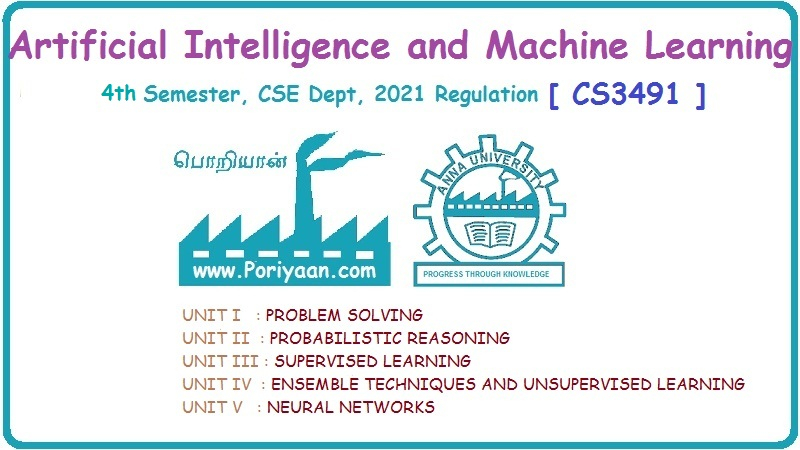Artificial Intelligence and Machine Learning: Unit I(b): Intelligent Agents and Problem Solving Agents
Rational Behaviour and Omniscience
Intelligent Agents and Problem Solving Agents - Artificial Intelligence and Machine Learning
If every entry in the agent function is filled correctly then the agent will always do the right thing. Such agent is called as rational agent. Doing the right thing makes agent most successful.
Rational
Behaviour and Omniscience
Rational Agent
•
If every entry in the agent function is filled
correctly then the agent will always do the right thing. Such agent is called
as rational agent. Doing the right thing makes agent most successful. So now we
need certain methods to measure the success of rational agent.
•
When an agent is working in the environment, it
generates a sequence of actions according to the percept it receives. This
sequence of actions leads to various states of environment. If this sequences
of environment state change is desirable, then we can say that agent has
performed well. So if the tasks and environment change automatically the
measuring conditions will change and hence there is no fixed measure suitable
for all agents.
•
As a general rule, it is better to design performance
measures according to what one wants in the environment, rather than according
to how one thinks the agent should behave.
•
The rationality depends upon four things –
1. The
performance measure that defines the criterion of success.
2. The
agent's prior knowledge about the environment.
3. The
actions that the agent can perform.
4. The
agent's percept sequence till current till current date.
Based
on above four statements rational agent can be defined as follows -
For
each possible percept sequence, a rational agent should select an action that
is expected to maximize its performance measure given the evidence provided by
the percept sequence and whatever built-in knowledge the agent has. Fig. 2.8.1
depits performance measure metric.
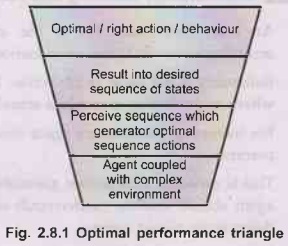
The Good and the Bad Agent
•
The concept of rational behaviour leads to two types
agents, the good agents and In the bad agent. Most of the time the good and bad
behaviour (that is performance) of the agent depends completely on the
environment.
•
If environment is completely known then we get
agent's good behaviour as depicted in Fig. 2.8.2.
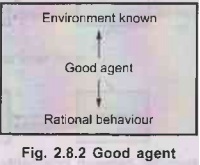
•
If environment is unknown then agent can act badly as
depicted in Fig. 2.8.3.
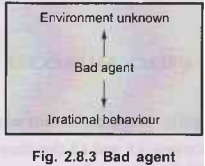
Omniscience, Learning and Autonomy
•
An omniscient agent knows the actual outcome of its
actions and can act accordingly, but in reality omniscience is impossible.
•
Rationality is not same as perfection. Rationality
maximizes expected performance where as perfection maximizes actual
performance.
•
For increasing performance agent must do same actions
in order to modify future percepts.
•
This is called as information gathering which is
important part of rationality. Also agent should explore (understand)
environment to increase performance i.e. for doing more correct actions.
•
Learning is another important activity agent should
do so as to gather information. Agent may know environment completely (which is
practically not possible) in certain cases but if it is not known agent needs
learn on its own.
•
To the extent that an agent relies on the prior
knowledge of its designer rather than on its own percepts, we say that agent
lacks autonomy. A rational agent should be autonomous - it should learn what it
can do to compensate for partial or incorrect prior knowledge.
Figure
depicting rationality and omniscience relationship
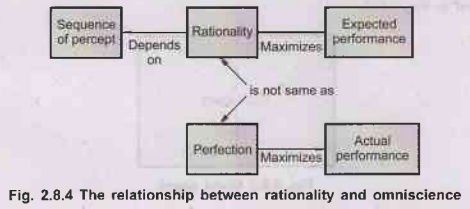
Artificial Intelligence and Machine Learning: Unit I(b): Intelligent Agents and Problem Solving Agents : Tag: : Intelligent Agents and Problem Solving Agents - Artificial Intelligence and Machine Learning - Rational Behaviour and Omniscience
Related Topics
Related Subjects
Artificial Intelligence and Machine Learning
CS3491 4th Semester CSE/ECE Dept | 2021 Regulation | 4th Semester CSE/ECE Dept 2021 Regulation
